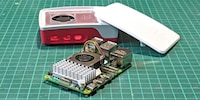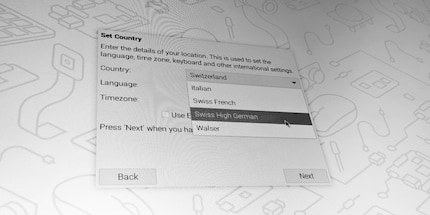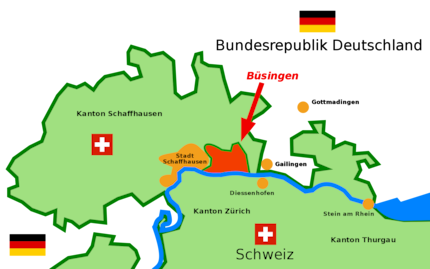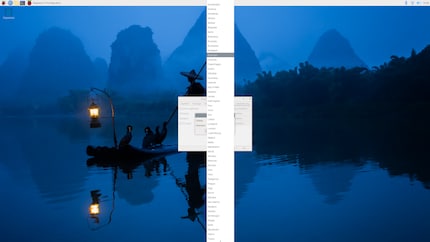
Guide
Raspberry Pi 5 - is the active cooler or the housing with fan worth it?
by Martin Jud

When you start the Raspberry Pi OS operating system for the first time, you can select "Swiss High German" in the language selection. But you can also choose "Walser". And for the time zone, you can select "Busingen" as well as "Zurich". That makes me wonder.
After I had installed the Raspberry Pi OS operating system on my DIY computer, my eyes widened as I was Swiss. This is because the country settings offered me the unusual languages "Swiss High German" and "Walser" when I first started up. I can't think of anything clear under either language. I also can't work out why there is a "Busingen" in addition to the "Zurich" time zone. Because the Büsingen I know is a German enclave in the canton of Schaffhausen.
Raspberry Pi OS differs from other Linux distributions such as Ubuntu not only in its old-fashioned appearance, but also in the initial setup. Raspberry Pi OS does not first ask you for the (system) language and then for the keyboard layout. It takes care of these two steps with a single query. A bit premature, but that's exactly where the dog is buried.
After the first start, these two options can be found separately in the settings. There you select the language environment and the time zone individually and without a strange name.

When I read "Swiss High German" for the first time, I naturally wondered what it was supposed to be. The first thing that came to mind was a quote from a long-dead politician:
There are foreigners who speak German without any accent; they are lucky. And then there are foreigners who speak an accent without any German at all; they are Swiss.
So could "Swiss High German" be a term for the language that we Swiss try to speak when we speak High German?
It could also be that this is a move to create a new language standardisation. Just as a German accent was once used for High German, a certain Swiss German could soon become a new official written language.
Because of the popularity of the word "Grüezi", "Züri-Dütsch" would probably be the most suitable. In terms of pronunciation alone, the dialects from Basel, St. Gallen or Thurgau would probably be suitable, as the letter R is not rolled there. But purely in terms of the cosiness factor, the somewhat slower pace that we Swiss are said to have, it would have to be Bernese German.
The "Hoch" could also be used to distinguish the mountain people from those in the lowlands. This could make sense, especially with "Bärndütsch", where the Oberlanders speak a different Bernese German dialect. Or maybe not.
Almost lastly, it occurs to me that High could be an abbreviation for Highness. Swiss German, a language of sovereignty or the language of the sovereign.
Even more far-fetched is the thought that it could be an allusion to our millennia-old and world-famous tradition of growing medicinal herbs. After all, when I'm sitting by the lake in Zurich, I'm regularly approached by tourists and asked where the nearest coffeeshop is. And after all, Swiss German itself sounds a bit like the stoned sister of High German.
But it's all humbug. Apart from that, Swiss High German actually already exists, even if we Swiss are not necessarily aware of it. I am only aware of the four official languages and the many different Swiss German dialects. It would never occur to me to say that anyone in this country speaks Swiss High German. And I don't know any people who write Swiss High German either. Here, people "talk" and write in "Baslerditsch", "Bärndütsch" and so on. Nevertheless, there is a Swiss High German dictionary. If you would like to find out more about the topic, I recommend this article by my colleague David.
As briefly mentioned at the beginning, the Swiss High German in Raspberry Pi OS is a result of trying to cover two options with one query. As a reminder: "Italian", "Swiss French", "Swiss High German" and "Walser" are available for selection.
For Italian, the system language and the keyboard layout are set to Italian - Raspberry Pi OS does not have a separate Swiss keyboard layout for Italian. However, there is for German and French. This explains why it says "Swiss" in each case. In my opinion, the designations "French (CH)", "French (Swiss)" or "French (CH Keyboard Layout)" would be more logical. Or "German (CH)" and so on - but without "High". Then everything would give a uniform picture.
But what if I choose Walser? Why are there four languages anyway?
It is possible that those responsible for this selection were aware that there are four official languages in Switzerland. However, they did not know exactly which was the fourth. So they looked at the cantons. And when they came across Valais, they said to themselves: "That must be it!"
A dangerous half-google later, the people responsible ended up on Wikipedia and read that the Alemannic ethnic group of the Walser (Rhaeto-Romanic Gualsers) colonised the Alpine region from the late High Middle Ages, starting in Upper Valais and moving towards Graubünden.
After this "realisation", however, those responsible made a mistake. They probably assumed that the Walser language already existed in the system and incorrectly linked it to the Welsh. Yes, you read that correctly, in the Walser selection you get the setting for Wales under Raspberry Pi OS. This means English language output and a keyboard layout in which Y and Z are reversed. So Walser has absolutely no place in this list.
I still don't understand why I can select the time zone "Busingen" in addition to "Zurich". If there were also Bern, Basel or Geneva, it would be a bit strange, as they all belong to the same time zone anyway. But Busingen and Büsingen respectively?

Büsingen is geographically located in Switzerland, but belongs to Germany. It is an enclave. This makes the fact that it belongs to Switzerland even more peculiar.

Or else, it explains it. Because why should the Kalingrad enclave be listed but Büsingen be missing? Although even with this logic, it is not clear why the second enclave, Campione in the canton of Ticino, is not also included.
If you have a better explanation for Büsingen or the Swiss High German and Walser languages, I look forward to your comment.
I find my muse in everything. When I don’t, I draw inspiration from daydreaming. After all, if you dream, you don’t sleep through life.
Interesting facts about products, behind-the-scenes looks at manufacturers and deep-dives on interesting people.
Show all
Background information
by Domagoj Belancic

Background information
by Kim Muntinga

Background information
by Anika Schulz